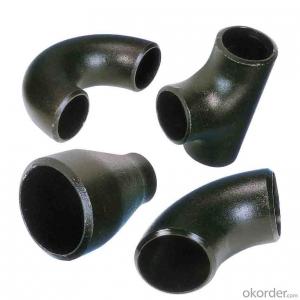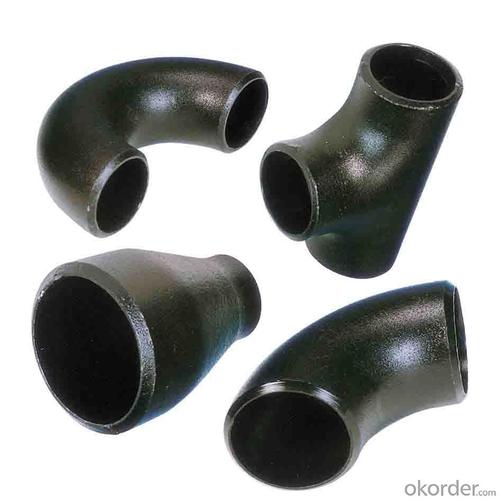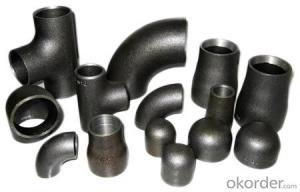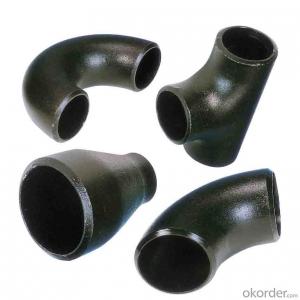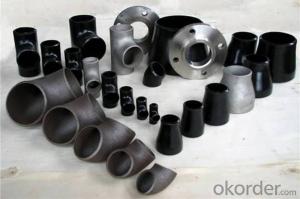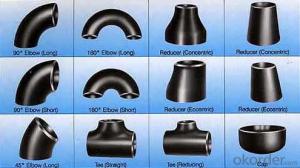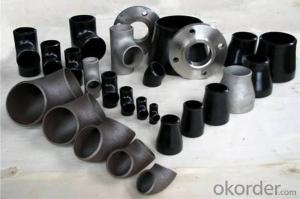48'' ELBOW TEE BEND FLANGE CARBON STEEL FITTINGS
- Loading Port:
- Tianjin
- Payment Terms:
- TT OR LC
- Min Order Qty:
- 5 m.t
- Supply Capability:
- 300 m.t/month
OKorder Service Pledge
OKorder Financial Service
You Might Also Like
Products Detailed Description
Products | pipe fittings elbows, bends,tees, reducers caps |
Size | 1/2" - 48" |
Wall thickness | Sch5-Sch160 XXS |
Standard | ANSI, ASME API5L, OCT, DIN and JIS, etc. |
we can also produce according to drawing and standards provided by customers. | |
Material | Carbon steel, alloy steel and stainless steel. |
We can produce according to materials appointed by consumers. | |
Packaging | Plywood Cases,plywood pallet, plastic bag or as customers requirement |
Surface Treatment | Shot blasted, rust-proof black oil |
Delivery Time | 10-60 days |
Quality | First grade |
Others | 1.Special design available according to your drawing. |
2.anti-corrosion and high-temperature resistant with black painting | |
3. All the production process are made under the ISO9001:2000 strictly. | |
4. A conformity rate of ex-factory inspection of products. |
Specifications
Ansi B16.9 WPB carbon steel pipe fitting elbow tee reducer
Size:Seamless 1/2"-24" Welded 1/2"-48"
ANSI B16.9 WPB carbon steel pipe fitting elbow tee reducer
1.Size: Seamless 1/2"-24" Welded 1/2"-48"
2. WT: SGP, STD, SCH40, SCH80, SCH100,SCH120,SCH160,XS,XXS
3. Material:
stainless steel Grade: 201,304,304L,316,316L,317,317L,904L,and etc
carbon steel Grade: WPB,GRB, Q235,16MN
Alloy steel: st35.8,st52,wp11,wp22,wp12 wp l6
4. Standard: ASTM/AISI/DIN/JIS
5. Type: Concentric and eccentric
6. Surface treatment: Transparent oil, rust-proof black oil
7. Applications range: Applications range: for use in the petroleum, smelting, foodstuff, power, papermaking, chemical, medical equipment,aviation, boiler heat exchanger, and other fields
8. Packing: wooden case or as per customers' requirement
- Q: What are the different types of steel pipe coatings for underground gas pipelines?
- There are several different types of steel pipe coatings used for underground gas pipelines. These include fusion bonded epoxy (FBE) coatings, three-layer polyethylene (3LPE) coatings, polyurethane (PU) coatings, and coal tar enamel (CTE) coatings. Each of these coatings provides different levels of corrosion protection and suitability for specific environmental conditions.
- Q: How are steel pipes used in the manufacturing of pressure vessels?
- Steel pipes are commonly used in the manufacturing of pressure vessels as they provide the necessary strength and durability to withstand high internal pressure. These pipes are welded or seamless and are often used as the main structural component of the vessel. They allow for the efficient flow of fluids or gases within the vessel and provide a reliable and secure containment system for various industrial applications.
- Q: What are the different types of couplings used with steel pipes?
- There are several types of couplings that can be used with steel pipes, including threaded couplings, compression couplings, and flanged couplings. Threaded couplings have threads on the inside and outside that allow pipes to be screwed together. Compression couplings use a compression fitting to connect pipes, providing a tight and secure connection. Flanged couplings have flanges on each end that are bolted together, creating a strong and durable joint.
- Q: Can steel pipes be used for oil refinery applications?
- Yes, steel pipes can be used for oil refinery applications. Steel pipes offer many advantages for oil refinery applications including high strength, durability, and resistance to corrosion. They are able to withstand high pressure and temperature conditions that are common in oil refinery operations. Steel pipes are also easy to transport and install, making them a popular choice for oil refinery projects. Additionally, steel pipes can be customized to meet specific requirements such as size, thickness, and coating, making them suitable for a wide range of oil refinery applications.
- Q: Are steel pipes suitable for underground gas distribution?
- Steel pipes are indeed appropriate for the distribution of gas underground. Due to their remarkable strength, durability, and resistance to corrosion, steel pipes are extensively employed in gas distribution systems. The ability of steel pipes to endure the pressure and stress in underground environments renders them a dependable choice for gas transportation. Moreover, steel pipes possess the added benefit of being capable of withstanding high temperatures and resisting fire, making them a secure alternative for underground gas distribution. Nonetheless, it is crucial to ensure that the steel pipes employed are adequately coated and shielded against corrosion to guarantee their longevity and avert any possible leaks or harm.
- Q: What is the difference between internal lining and external coating of steel pipes?
- The distinction between the internal lining and external coating of steel pipes can be found in their respective functions and locations. Internal lining serves as a safeguard for the inner surface of steel pipes, shielding it from corrosion, abrasion, and other forms of harm. It creates a barrier between the transported fluids or substances and the steel pipe, preventing direct contact and potential deterioration. The materials utilized for internal lining, such as epoxy, polyethylene, or cement mortar, are dependent on specific requirements and the nature of the substances being transported. The internal lining ensures the longevity and integrity of the steel pipe by reducing the risk of internal corrosion and contamination. On the other hand, external coating is applied to the outer surface of steel pipes. Its primary purpose is to provide protection against external factors such as weathering, soil corrosion, and mechanical damage. Acting as a shield, the external coating safeguards the steel pipe from environmental conditions like moisture, UV radiation, chemicals, and physical impact. Common materials used for external coatings include fusion-bonded epoxy, polyethylene, polypropylene, or bitumen. The selection of coating depends on factors such as exposure conditions, temperature, and the type of soil or surroundings the steel pipe will encounter. In summary, internal lining safeguards the inner surface of steel pipes from corrosion and damage caused by transported substances, while external coating acts as a barrier against external elements and physical stresses. Both internal lining and external coating play crucial roles in ensuring the durability and reliability of steel pipes in various applications, such as oil and gas pipelines, water supply systems, or industrial processes.
- Q: Galvanized steel pipe DN100 and SC100
- Zinc plating, hot dip galvanizing and cold galvanizing, to see the design instructions and design requirements, which will explain
- Q: Are steel pipes suitable for underground installations in areas with high moisture content?
- In areas with high moisture content, steel pipes are commonly used for underground installations. However, it is important to consider certain factors when utilizing steel pipes in such conditions. Prolonged exposure to moisture can lead to corrosion, which is a significant concern. To mitigate this risk, it is crucial to employ steel pipes that are specifically designed for underground installations and are coated with protective materials like epoxy or polyethylene. These protective coatings act as a barrier between the steel and the surrounding moisture, preventing corrosion and prolonging the lifespan of the pipes. Furthermore, proper installation techniques, including sufficient pipe bedding and backfilling, must be adhered to in order to ensure that the pipes are adequately supported and shielded from external forces. Regular inspection and maintenance are also advisable to promptly identify any signs of corrosion or damage and address them accordingly. Overall, by taking the appropriate precautions and conducting regular maintenance, steel pipes can be a viable choice for underground installations in areas with high moisture content.
- Q: How are steel pipes used in the mining industry?
- Steel pipes are commonly used in the mining industry for various purposes such as transporting water, slurry, and other materials, as well as for ventilation and support systems in underground mines.
- Q: What are the factors affecting the price of steel pipes?
- There are several factors that can affect the price of steel pipes. Some of the key factors include the cost of raw materials such as iron ore and other metals, energy prices, labor costs, transportation costs, and market demand and supply dynamics. Additionally, currency exchange rates, government regulations, and trade policies can also impact the price of steel pipes in the global market.
Send your message to us
48'' ELBOW TEE BEND FLANGE CARBON STEEL FITTINGS
- Loading Port:
- Tianjin
- Payment Terms:
- TT OR LC
- Min Order Qty:
- 5 m.t
- Supply Capability:
- 300 m.t/month
OKorder Service Pledge
OKorder Financial Service
Similar products
Hot products
Hot Searches
Related keywords
